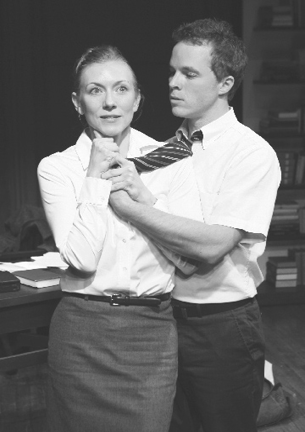By Steven Snyder
A. R. Gurney imagines a world without him
Shakespeare said “the play’s the thing,” but halfway through A.R. Gurney’s latest comedy, “Post Mortem,” it’s clear that at least one playwright isn’t quite so sure anymore.
In his fourth world premiere at the Flea Theater, Gurney has decided to move beyond the timely political rhetoric of his previous work to question the very art form of theater itself, devising a sporadically cynical, often obtuse play that somehow manages to be both self-congratulatory and self-deprecating.
Not to mention self-referential.
A.R. Gurney’s “Post Mortem” is a play about people in the future talking about a great lost masterpiece of theater — A.R. Gurney’s “Post Mortem,” a work made back in the dark ages of George W. Bush, which changed the world.
It’s a lofty, and unusual, claim for a playwright to make about his own work — though it becomes clear in the play’s final moments that Gurney’s real interest is not to be found in stroking his own ego, nor in tearing himself down (the play’s drama teacher initially dismisses Gurney as one of the theater’s more minor players), but in questioning the very merits of theater as a gateway to critical or enlightening thought.
It’s a play that tells us plays are important, but that they can only do so much — a complicated theme in a play that worms its way inside your head, even while you’re scratching it in disbelief.
Things start this way: Alice (Tina Benko) is a drama teacher at a faith-based Midwest university in a bleak future society of omnipresent surveillance, pervasive fear and artistic trepidation. Dexter (Christopher Kromer) is one of her smitten students, not afraid to express his awkward affections for his teacher and convinced he has found the perfect topic for a senior thesis.
Out of view from the prying government, Dexter recalls how he unearthed a handful of ancient texts from a little-known American playwright — yes, Gurney. And Gurney’s last, never-produced production — “Post Mortem” — is an epic work, Dexter insists.
Alice is skeptical but eventually agrees to help her student stage a production. And we are reintroduced to the two years later, after that production has led the two to fall madly in love, win the Nobel Prize, and guide the world into a new period of enlightenment. The play’s second act finds them returning back to their Alma matter for a Q&A session, heralded as heroes for discovering and reviving this lost master of theater. The joke of “Post Mortem,” of course, is that we never get a scene, much less a sentence, of this epic production. It’s always being talked about, never shown to us. Around and around these characters dance, talking of this romantic, political and spiritual masterwork, without ever letting us, the audience, in on the tune they’re waltzing to.
Instead we get offered morsels of distraction, such as the romance between teacher and son, a rambling aside about the ways cell phones are destroying the communal experiences of theater and dinner, and the mystery surrounding Gurney’s death, or rather murder, at the hands of Dick Cheney.
We’re also given a trio of strong performances. Kromer, as Dexter, approaches the naivety of his young college student with such passion that he turns a character who could so easily have been mocked into the idealized personification of optimism. Benko, as Alice, plays her part as if she was the audience’s voice in the story, at first euphoric about the discovery of a new play and giddy over its success, but ultimately disillusioned by the gap that still exists between what happens on the stage and what happens in real life. Shannon Burkett offers some much-needed comic relief later on as the inexperienced, unfocused moderator of the second act’s Q&A session.
But the play — which has lost a good deal of steam by the time Burkett takes the stage, wandering aimlessly for far too long, and meandering way too far off course — finally hits its stride when a distraught Alice faces the audience and talks about the melancholy that has overcome her since “Post Mortem’s” global success.
Here you have the best play in the world, she says, but it still does not help us learn how live, how to love or how to grow. There is still something missing — an inability for Gurney’s brilliant words to transfer to the realm of reality.
The title of this play, and the play within the play, has nothing to do with Gurney’s fictional assassination, nor the story’s theme of this masterwork being discovered posthumously. It is meant to refer to the death of theater itself. “Post Mortem,” in some moments, has the feel of a eulogy.
And while Alice praises the audience for coming to the theater, for at least daring to engage the conversation, there’s no mistaking a larger theme here that only so much can be learned by printed words on the page or spoken words on the stage.
There’s an ocean of disillusionment here, as if Gurney feels the sun is setting on not just a career (he himself is 76 years old) but an art form. And though he refuses to go quietly into that good night, Gurney also seems open to the possibility that theater is a flawed enterprise. The play is not the thing, he seems to be suggesting, but a thing — and what we do with that thing matters far more than simply what it is.























